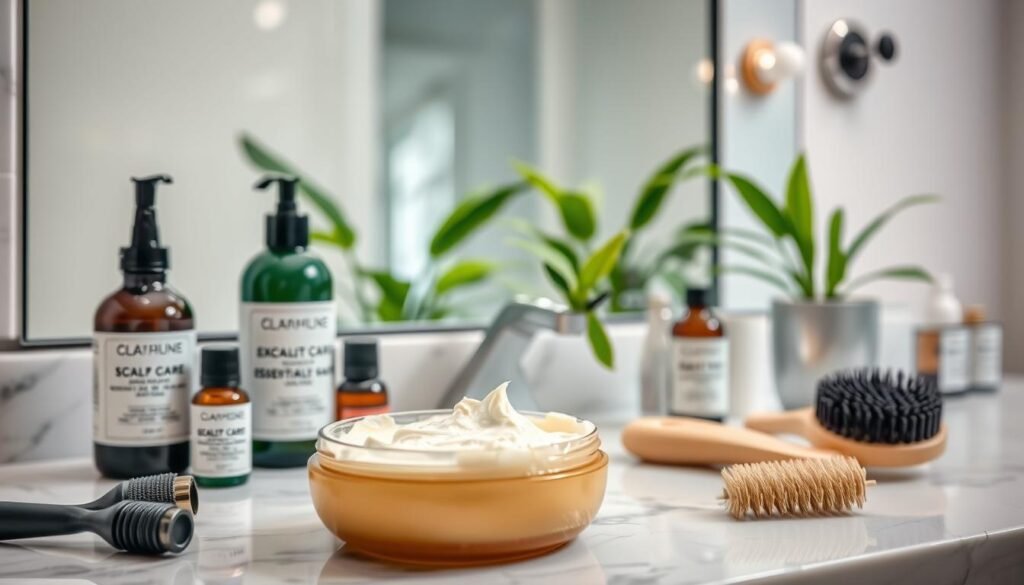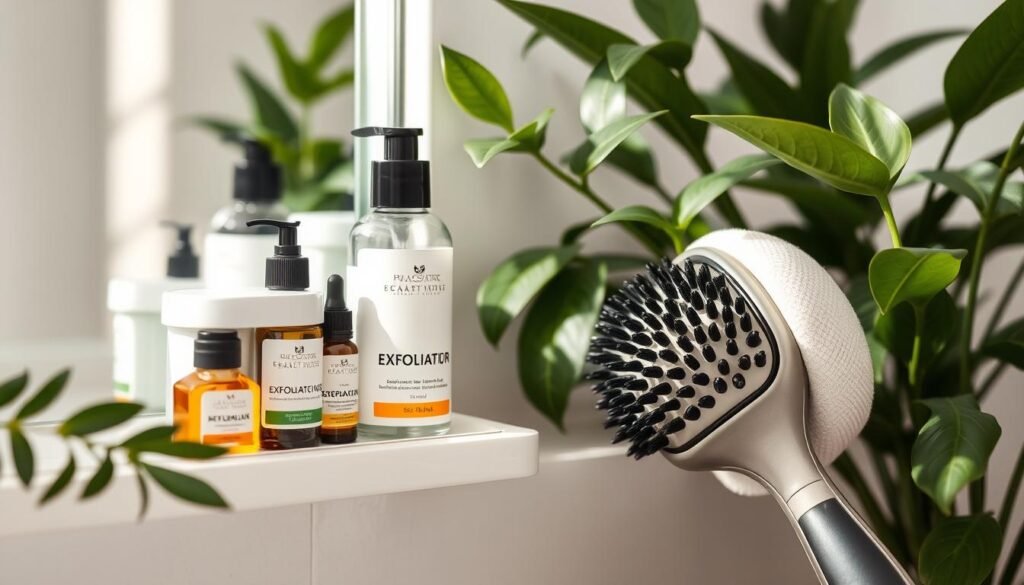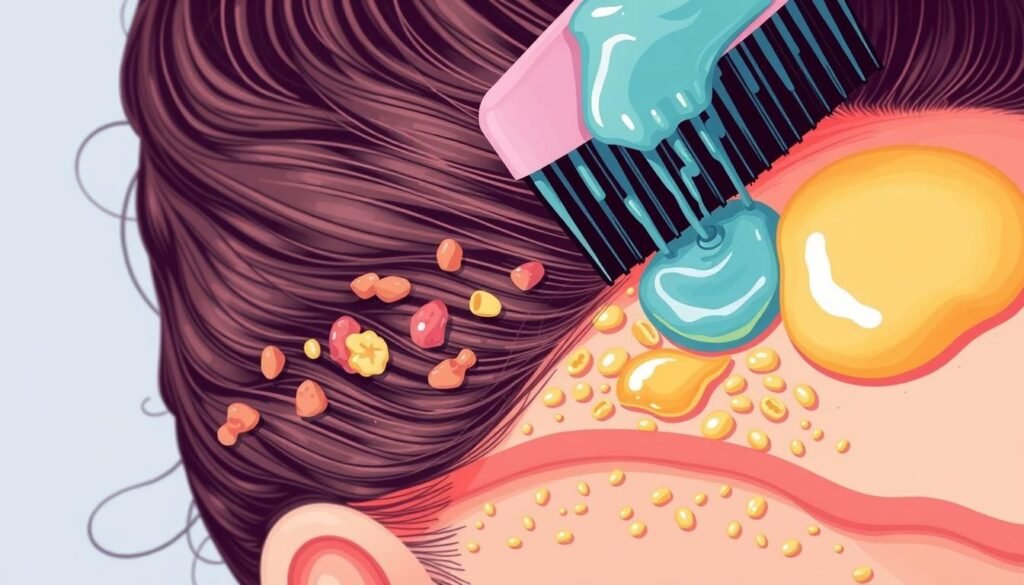Did you know that around 50% of adults will deal with dandruff? This scalp issue leads to itchiness and visible flakes. These symptoms can lower one’s self-confidence. People often ask, “How often should you exfoliate your scalp?” It’s crucial to know how often to exfoliate to stop dandruff and boost scalp health. Regular exfoliation helps reduce dandruff and encourages healthy hair growth. Let’s delve into why scalp exfoliation is necessary and how it maintains a healthy, flake-free scalp.
Exfoliating helps get rid of dead skin, extra oil, and product residue. These are the main causes of dandruff. Knowing the right exfoliation frequency is key for better scalp health and hair strength.
Key Takeaways
- Nearly half of adults experience dandruff at some point.
- Regular scalp exfoliation aids in dandruff prevention.
- Understanding the frequency of exfoliation is crucial for scalp health.
- Exfoliation can enhance both scalp and hair vitality.
- Establishing a routine can help combat the symptoms of dandruff.
Understanding Dandruff and Its Causes
Dandruff is a common issue that causes flaky skin on the scalp. It can also make your scalp itch and feel uncomfortable. It’s not just a minor problem, but a sign of deeper scalp health issues. Many things can lead to dandruff, which we call dandruff causes.
Dry skin is a big reason why people get dandruff, causing flaky patches. Sometimes, the hair products you use can irritate your scalp, if you have sensitive skin. Also, a fungus named Malassezia can make dandruff worse by irritating your scalp.
Conditions like psoriasis can make dandruff more likely too. Knowing these causes can help you take better care of your scalp. You might try exfoliating to keep your scalp healthy and reduce dandruff. To learn more about dandruff and how to handle it, check out this resource for detailed info.
It’s important to understand what causes dandruff if you have it. This knowledge can lead to new ways to treat and manage it. That way, you can keep your skin and hair healthier.
Benefits of Scalp Exfoliation for Dandruff Prevention
Scalp exfoliation offers many benefits, especially for stopping dandruff. It removes dead skin, extra oil, and buildup from products. This helps keep the scalp healthy. It balances the scalp, which helps hair grow well.
Another benefit is better blood flow to the scalp. This makes the hair follicles healthier, leading to stronger hair. It can also help reduce dandruff over time. If you exfoliate regularly, dandruff shampoos and treatments work better. They go deeper into the scalp and are more effective.
Adding scalp exfoliation to your hair care routine can improve scalp health. It decreases the buildup of stuff that can irritate the scalp. This lowers the chance of irritation and dandruff outbreaks. You’ll see the benefits of scalp exfoliation in preventing dandruff.
| Benefits of Scalp Exfoliation | Impact on Dandruff Prevention |
|---|---|
| Removes dead skin cells | Makes scalp less prone to irritation |
| Enhances blood circulation | Promotes healthier hair growth |
| Minimizes product buildup | Improves effectiveness of anti-dandruff products |
| Reduces excess oil | Balances scalp environment |
| Soothes irritation | Decreases dandruff flare-ups |
How Often Should You Exfoliate Your Scalp
Finding the best scalp exfoliation frequency depends on your hair type and scalp health. Many people do well with exfoliating once a week. However, certain factors might change how often you should do it.
Finding the Right Frequency for Your Scalp
If you have an oily scalp, exfoliating more often might help. Doing it twice a week can reduce oil and prevent dandruff. But if your scalp is dry, it’s better to exfoliate less often, like every two weeks. It’s important to find what works best for you, so your scalp stays healthy without getting irritated.
Factors That Influence Scalp Exfoliation Frequency
Various things can affect how often you should exfoliate your scalp:
- Hair Type: People with curly hair might not need to exfoliate as much as those with straight hair. This is because curly hair is naturally drier.
- Environmental Conditions: Living in a humid or polluted area can make it necessary to exfoliate more often.
- Product Use: Using a lot of hair styling products might mean you need to exfoliate more to avoid buildup.
Knowing these factors can help you create a custom exfoliation plan. For more details on the benefits of scalp exfoliation, check out this useful resource.
| Scalp Type | Recommended Exfoliation Frequency |
|---|---|
| Oily | 1-2 times a week |
| Normal | Once a week |
| Dry | Every 2 weeks |
| Color-Treated | Once every 1-2 weeks |
The Importance of a Consistent Scalp Care Routine
Having a steady scalp care routine is key for a healthy scalp and dandruff prevention. Doing this regularly helps lower inflammation and tackle dandruff’s root causes. Without a proper routine of exfoliation, cleansing, and moisturizing, different scalp problems might arise.
Exfoliating is crucial. It removes dead skin and buildup, improving blood flow. This leads to stronger hair roots and boosts hair health. Adding exfoliation to the scalp care routine means carefully managing each step for the best outcome.
It’s also important to keep the scalp hydrated. A moist scalp feels better and reduces dry flakes. Use gentle methods along with exfoliation.
These regular steps do more than clean; they nourish the scalp too. This helps guard against dandruff. Being proactive in scalp care can cut down on flakes and irritation.

Want more scalp care tips? Check out this link: dandruff prevention techniques. Using these tips often can lead to a healthier scalp and less dandruff.
Choosing the Right Scalp Scrub
Finding the perfect scalp scrub is key for better hair health and fixing scalp problems. It matters to pay attention to the scrub’s ingredients. They greatly impact how well the scrub works. Knowing what’s in it can lead to a wise choice.
Ingredients to Look for in a Scalp Exfoliator
Good scalp scrubs have various helpful ingredients. Some top picks include:
- Salicylic Acid: This key ingredient goes deep into hair follicles. It helps clear buildup and fights dandruff.
- Tea Tree Oil: Famous for fighting fungus, tea tree oil calms irritation and stops flakes.
- Natural Exfoliating Agents: Using things like salt or sugar means a soft but effective scrub. They remove dead skin gently and avoid irritation.
Product Types for Effective Exfoliation
There are many kinds of scalp scrubs to meet different tastes and needs. Here are some to consider:
| Type | Description | Effectiveness | Price Range |
|---|---|---|---|
| Chemical Exfoliators | They have acids that melt away dead skin. | Great for a deep clean. | $$ |
| Physical Scrubs | They physically scrub the scalp with granules. | Good for cleaning the surface. | $ |
| DIY Scrubs | You can make these at home with natural stuff. | You can tweak them, but results may vary. | $ |
Knowing which ingredients work best and the types of products can lead to effective scalp care. For further details on scalp health, check out this source.
How Exfoliation Improves Scalp Health
Exfoliating your scalp is key to maintaining its health. It helps remove dead skin that piles up. This can block hair follicles and lead to irritation or dandruff. Knowing how exfoliation helps will encourage a better scalp and hair growth.
A good scalp scrub reduces the chance of infections from trapped dirt. It keeps the scalp from getting irritated. This creates a better environment for hair to grow well. A clean scalp also means stronger, shinier hair.

To highlight how exfoliation helps the scalp, here are its main benefits:
| Exfoliation Benefit | Description |
|---|---|
| Unclogs Follicles | Regular exfoliation clears obstructed follicles, promoting healthier hair growth. |
| Reduces Irritation | By removing dead skin and buildup, exfoliation lessens overall scalp discomfort. |
| Enhances Circulation | Massaging while exfoliating boosts blood flow to the scalp, nourishing hair follicles. |
| Minimizes Buildup | Consistent exfoliation prevents product accumulation, keeping the scalp clean and free. |
| Encourages Scalp Renewal | Promotes the growth of new, healthy skin cells, contributing to overall scalp vitality. |
Adding regular scalp exfoliation to your hair care routine boosts scalp health. Understanding these benefits guides us to better scalp care, resulting in gorgeous hair.
Tips for Effective Scalp Exfoliation
Scalp exfoliation improves scalp health if done right. Using effective methods can bring out the best results and leave your scalp feeling refreshed. Let’s dive into tips for great scalp exfoliation and how to take care of your scalp after.
Techniques for Applying Scalp Scrubs
Scalp scrubs remove dead skin and buildup gently. Here are the best ways to do it:
- Choose the right amount: You only need a little scrub for a good clean.
- Apply to dry hair: Dry hair helps the scrub stick better and work more efficiently.
- Use gentle circular motions: Circular movements boost blood flow and remove dirt more effectively.
- Focus on problem areas: Give extra care to places where buildup happens often.
Post-Exfoliation Care for Your Scalp
After exfoliating, it’s key to take care of your scalp properly. Here are the top tips:
- Rinse thoroughly: Make sure to wash away all traces of the scrub to avoid irritation.
- Moisturize: A good conditioner or scalp treatment will keep your scalp hydrated.
- Protect from environmental elements: Wearing a hat can shield your scalp from too much sun.
Recognizing Signs of Clogged Follicles and Product Buildup
Spotting clogged follicles or product buildup early is key for a healthy scalp. Look out for the following signs:
- Persistent itching: Constant itching could point to problems with scalp health.
- Reduced hair growth: Hair thinning or slow growth might indicate blocked follicles.
- Visible flakes: Seeing flakes or dandruff often means there’s a buildup of products and debris.
Acting quickly can really help. Adding a scalp scrub to your care routine can help with removing buildup. It can also get follicles working right again. Learning how your scalp reacts to different products leads to better scalp care. This means choosing the best ways to keep it clean.

The Relationship Between Exfoliation and Hair Growth
Exfoliating the scalp is key for better hair growth. It gets rid of dirt, dead skin, and too much oil. This makes a clean place for hair to grow. It helps blood flow better to the hair roots. This leads to stronger and healthier hair growth.
Exfoliating often helps your scalp stay clean and take in nutrients from hair products better. When the follicles are clean, they soak up good things easier. This is important for healthy hair. So, it’s vital to exfoliate the right way for the best scalp health.
There are two main ways to exfoliate: with scrubs or chemical products. For example, using a product like the Clarifying Scalp Exfoliant can be very helpful. Products like these encourage new skin and hair growth while preventing dry scalp.
In conclusion, regular scalp care through exfoliation is key for good hair. A healthy scalp is the foundation for thick and strong hair. Such care leads to vibrant, full hair.
When to Consult a Professional for Scalp Issues
Knowing when to get help for scalp problems is key to keeping your scalp healthy. If you have ongoing irritation, bad dandruff, or a lot of hair loss, it’s time to take action. These signs might show that you have a deeper issue with your scalp.
Talking to a dermatologist or a trichologist can give you answers specific to your situation. They are experts who can figure out problems that home treatments can’t. For conditions like eczema, psoriasis, or fungal infections, they can offer special treatments.
- If irritation lasts longer than a few weeks
- Severe dandruff persists despite regular treatment
- Unusual or excessive hair loss occurs
- Visible redness, swelling, or sores appear on the scalp
Seeking help early by seeing a professional can improve your scalp health. If you have any of the symptoms listed, it’s wise to see a specialist. They can suggest the best treatments for you.
| Symptom | Possible Condition | Recommended Action |
|---|---|---|
| Persistent Itching | Allergic Reaction or Dermatitis | Consult a dermatologist |
| Severe Dandruff | Malassezia Dermatitis | Seek specialized treatment |
| Hair Thinning | Alopecia Areata | Professional evaluation needed |
| Redness and Sores | Psoriasis or Infection | Immediate consultation advised |
Conclusion
Keeping a steady scalp care routine is key for stopping dandruff. Regularly exfoliating the scalp helps take away dead skin, oil, and buildup. This leads to a healthier scalp.
Exfoliating can majorly boost scalp health and cut down on dandruff. It’s a good idea to add this step to your beauty routine.
Not everyone’s scalp care needs are the same. It depends on what your hair is like and what you prefer. Picking the right exfoliation products and how often to use them can make a big difference. This helps keep your scalp balanced and healthy.
By being smart about scalp care, you can avoid dandruff. Plus, it makes you feel better overall. Prioritizing scalp health makes your hair look great and boosts your confidence in your grooming habits.